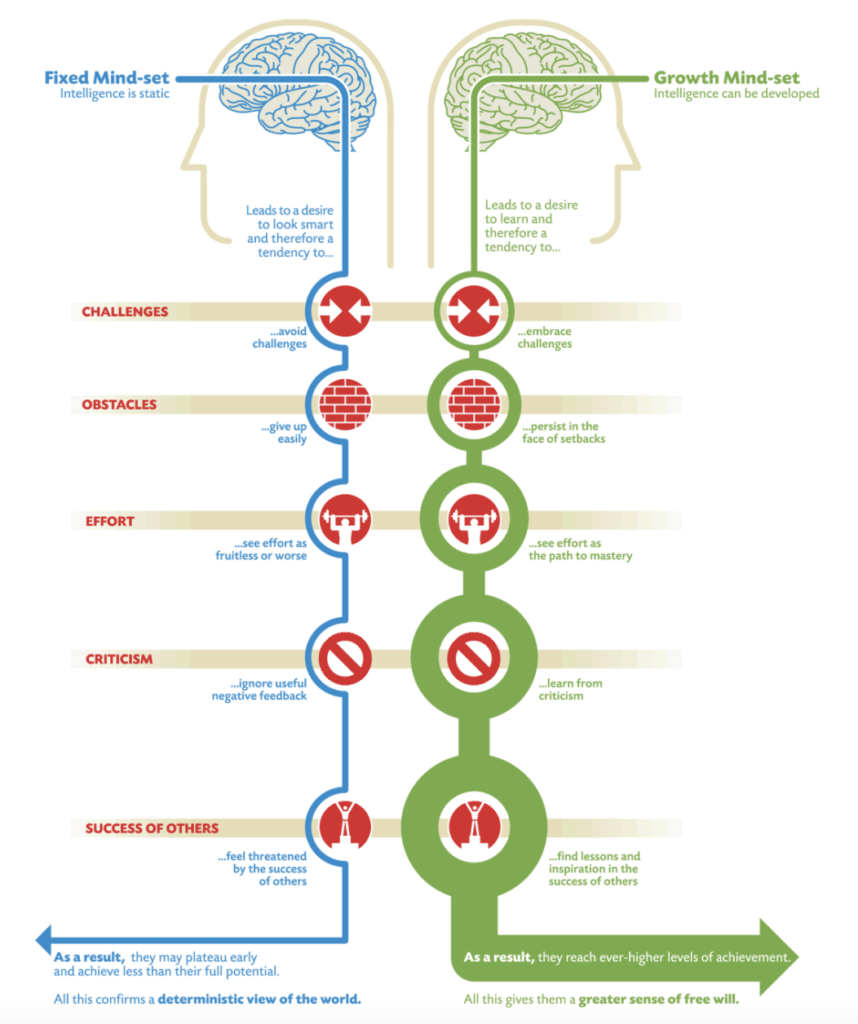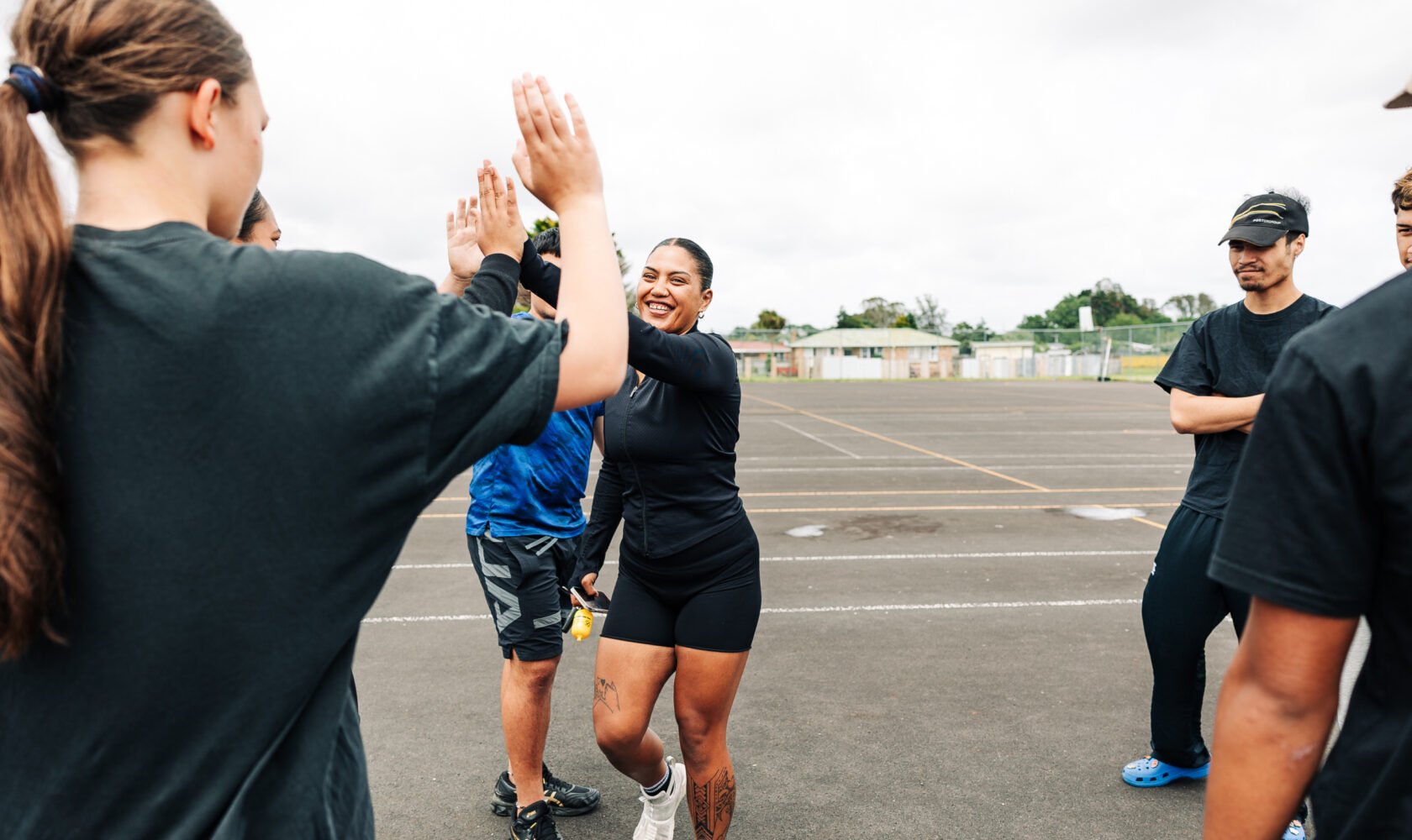Coach, do you want to develop confident and resilient athletes? Then coaching your athletes to develop a growth mindset should become a key part of your coaching toolbox.
Research has shown that having a growth mindset is a great predictor of young people (and people in general) being more likely to achieve both performance and learning goals (such as learning new skills). A growth mindset allows people to embrace challenges and learn from their mistakes. It enables them to see themselves as capable of learning and growing, no matter what their age or experience level may be. In this blog post, we will explore what a growth mindset is, and outline some strategies that you, as a coach, can use to help your athletes develop a growth mindset.
What is a mindset?
Dr. Carol Dweck first introduced the concept of mindsets in 1988. In her research, she showed how mindsets were important for determini8ng motivation and ultimately enabling or inhibiting positive outcomes in learning and achievement. Simply put, one’s mindset is your belief about whether your intelligence (in the widest sense of the word) is malleable – is it static or can it grow? Another way of putting this is whether you view your and other people’s abilities as innate and predetermined, or as pliable and developable (on a side note, the contrast of these two types of views are an important consideration for how coaches think about talent!).
In her book, Mindset: The New Psychology of Success, Dr. Carol Dweck describes two different types of mindsets: fixed mindset and growth mindset.
Fixed mindset
A person with a fixed mindset typically will:
- Believe intelligence is static
- Avoid challenges
- Give up easily in the face of obstacles and setbacks
- Not value effort or the point of putting in the effort
- Ignore feedback and criticism
- See success by others as a threat
Consequently, people with a fixed mindset often plateau early and don’t achieve their potential.
Growth mindset
A person with a growth mindset typically will:
- Believe intelligence is something that can be grown
- Embrace challenges
- Persist in the face of obstacles and setbacks
- Values effort as crucial for mastery
- Be open to receiving and learning from criticism and feedback
- Be inspired by and learns from the success of others around them
Consequently, people with a growth mindset reach higher levels of achievement and in turn have a greater sense of free will.

What strategies can coaches use to develop a growth mindset in their athletes?
The ten strategies below can be used by coaches in training and competition to support their athletes to develop a growth mindset. You don’t need to implement them all at once, consider trying at most two-three at one time.
1 | Educate and discuss
Learn more about mindsets and share this knowledge with your athletes. Create spaces and time to talk with your athletes about mindsets, explain the differences between a growth mindset and a fixed mindset, and highlight the benefits of having a growth mindset. For learning about mindsets, a good place to start is Dr. Carol Dweck’s book, Mindest: The New Psychology of Success.
2 | Cue athletes to check their mindset
For example, at the start of training, ask athletes to “switch on their growth mindset”. Praise athletes when you see the implementation of a growth mindset.
3 | The power of “yet”
A key idea of growth mindset is the belief that abilities are not finite or fixed. Add “yet” to your vocabulary as a coach, and encourage athletes to add it to theirs. You want to shift athletes from believing “I can’t do it” to believing “I can’t do it yet”.
4 | Share real-life stories of growth
Find and share films, documentaries, videos, articles, blogs, and books that showcase athletes’ growth journies. Connect with your athletes over these stories, and prompt them to think about what features of a growth mindset the featured athlete displayed.
5 | Encourage small challenges frequently
This could look like a weekly challenge plan, where athletes are tasked with a difficult goal each week that will stretch them. These goals might be decided by an athlete, the coach, or in combination. If an athlete achieves a goal, great, but it’s important that the focus here is on building athletes’ confidence to tackle challenging situations.
6 | View mistakes and failure as learning experiences
Discuss with athletes the importance of mistakes and failure for learning and growing. Set up culture and environment where trying new skills is encouraged. Learning should be messy. Failure should not be avoided. Tim Ferriss frequently asks guests on his podcast “What is your favourite failure?”, to find out what failures have then led to great success. Spend time with your athletes unpacking failures and mistakes and helping them to learn from them.
Watch – Coaches: How do you respond to repeated mistakes?
7 | Watch how you provide feedback and praise
A quick comment here, an affirmation there – these words can seem pretty innocuous at first, but cumulatively and particularly over time, these words have a large impact on athletes. Feedback and praise should be targeted at learning, growth, effort rather than outcomes. Link praise about skills and ability back to process, practice, and discipline previously demonstrated by the athlete. Be wary of comparing athletes against each other, rather better to compare an athlete to her or his past performance.
8 | Watch how and what you criticise
Be critical of effort and discipline. Avoid criticising ability. If you coach a team, you can encourage the team to be accountable to each other, but likewise, mind that athlete to athlete criticism is directed at effort and discipline as opposed to ability.
9 | Focus on process over outcome
Encourage athletes to be process orientated by having them focus their attention and efforts on what they have to do to get better, grow and develop. Athletes will benefit in the long run if they chase getting better more so than results. You can see this mindset in Steven Adam’s when he talks about getting addicted to getting better:
I just got addicted to getting better. My coach gave me a goal to get a tip dunk in a game – you know, a putback dunk off a rebound. I had never done that. He told me that he’d get me a pair of new shoes if I did it. I just kept trying. I couldn’t get it, couldn’t get it, couldn’t get it. It took me a year or so. Finally, one game, I got it.
10 | Harness the power of self-reflection
Routinely spend time with your athletes after training and competition, facilitating them to reflect on what things went well and what didn’t. Support athlete’s to take action from this to get better (this could be continuing to develop a strength or working on a weakness).
In summary
Dr. Carol Dweck’s work into mindsets shows how young people’s beliefs about their own capabilities have an enormous impact on their life. As a coach, you are well-positioned to support the growth and development of young people. By applying a few simple and tangible strategies into your coaching, you can make a big impact in fostering a growth mindset in young people, which in turn will benefit them to grow as an athlete and more broadly as a person.
Image Source: Canva







